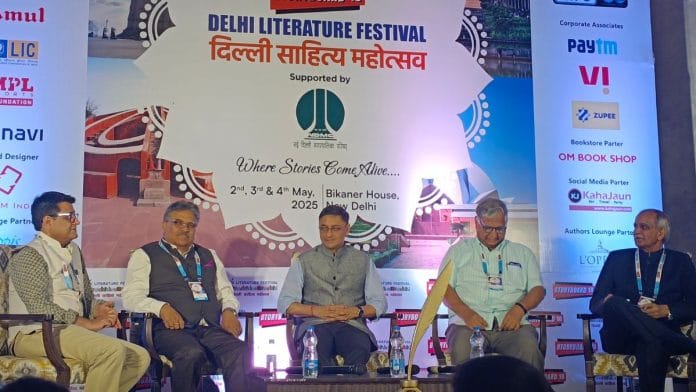New Delhi: Love, religion, and India-Pakistan relations were all part of the Delhi Literature Festival 2025 that began on 2 May. However, despite the line-up of events, discussions, and book launches, one element was conspicuously absent: the audience.
With a seating capacity of 150-200 people, Delhi’s Bikaner House, the venue for the event, had only 20-30 people in attendance during most sessions.
In a discussion around the Pahalgam terror attack, Amarendra Khatua, former secretary at the Ministry of External Affairs, took note of this as well.
“Why is there such a small audience?” he asked, addressing a person sitting next to him before the discussion began.
A few talks, however, saw the audience grow, such as the one on Demography, Dialogue, and Development by BJP MP Bansuri Swaraj. Other speakers included Delhi Legislative Assembly Speaker Vijender Gupta, who inaugurated the festival, NDMC chairperson Keshav Chandra, and Tim Curtis, director and representative of UNESCO’s New Delhi office.
“Literature is not only for the literate, but a right for all. It is a mirror to society, and festivals like these ensure that voices from all walks of life are heard and celebrated,” said Vijender Gupta.
For Keshav Chandra, Delhi and literature share a special bond.
“I believe that literature is a voice directly connected to the soul,” he said, adding that “there is literature in every road, alley, and building of Delhi.”
Chandra then emphasised the importance of reading books in the digital age and also offered some advice to the audience.
“Don’t read books just to pass an exam. There’s nothing like taking a book in your hands—you can flip from one page to another, underline the text, mark pages, and go back whenever you want,” he said, urging a group of young attendees seated at the back to develop stronger reading habits.
India’s foreign policy
The festival offered a platform for authors, writers and audience members to condemn the Pahalgam terror attack.
In a session, Navigating the Global Tides, Anil Trigunayat, former Indian Ambassador to Jordan, Libya and Malta, author Harsh V Pant, Amarendra Khatua, author Ashok Motwani, and economist Sanjeev Sanyal discussed the suspension of the Indus Waters Treaty with Pakistan.
“Now is the time to bring about that change and hit it where it hurts. It will affect them (Pakistan) in the long term,” said Motwani, who co-authored ‘Indus Waters Story: Issues, Concerns, Perspectives’. The book highlights the sensitive and longstanding water-sharing dispute between India and Pakistan.
The discussion also touched upon India’s foreign policy and how the country is preparing for future challenges.
“What is required for us to become what we aspire to be is the development of comprehensive national power—with sufficient deterrence, both military and soft power. India is not aiming to become a major military power, but a power capable of defending itself. That has always been our primary objective.” said Trigunayat.
India is not rushing into a response to the Pahalgam attack because its focus is on delivering a foolproof, long-lasting impact, not merely crossing the border to carry out a symbolic strike this time. “India’s foreign policy has become more robust, more resilient, and more result-oriented,” he added, emphasising that Pakistan is no longer seen as India’s competition—China is.
Also read: Young, Left, and reading—Delhi’s May Day Bookstore celebrates Workers’ Day for the 13th year
The Mahabharata
A session on Mahabharata caught the attention of the audience members as Divyansh Mundra, author of Mahabharat 2025: The Secrets of Shunya, explained why the young generations can always learn from the epic.
He said while many are familiar with Mahabharata, very few know what happened after the war.
Mundra, who creates Instagram reels featuring stories from Mahabharata, said the new generation needs an easier and interesting way to understand such epics.
“Mahabharat is the greatest epic in Indian history—even young people today want to know more about it,” he added.
The missing audience
Speaking about the steady decline in audience for literature, poet, lyricist and writer Pratap Somvanshi said continuous efforts are being made in this direction.
“With new writers and their new approaches, new readers will also return to literature,” he said.
However, it’s not as if the audience was entirely absent from the Delhi Literature Festival. From time to time, new faces appeared—some to listen to their favorite authors, others simply to take a selfie with them.
Parth and Rohan, standing at the book stall, hadn’t come to attend any discussion or participate in the festival itself — it was a selfie with an author and his autograph that brought them here.
“We saw a reel about the fest on Instagram and noticed the name of a young author we follow on social media. So we came here to take a selfie with him,” said Parth.
Some groups and families entered the hall but left within a few minutes. Anil Pandey, who had come to the festival with his wife and two daughters, also exited early, before taking photos outside in a green, scenic area near the venue.
“We thought there would be food stalls, a variety of books, and other stationery booths to enjoy a weekend with the kids. But there’s nothing like that here, so we’re heading out,” Pandey said.
(Edited by Aamaan Alam Khan)






